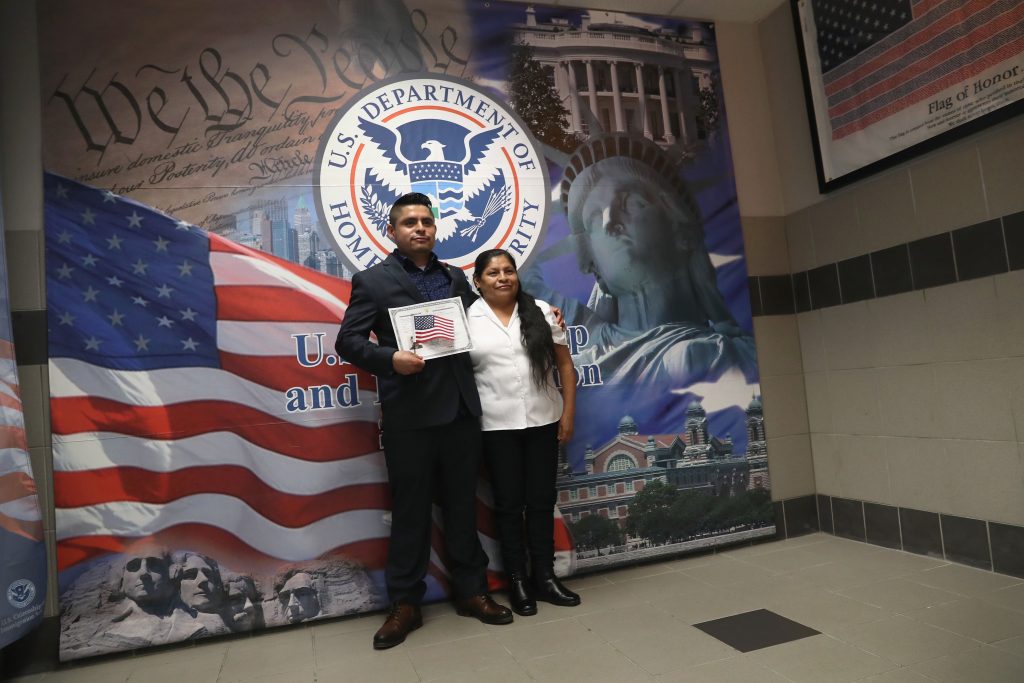You’ve probably heard a lot lately about so-called “chain migration.”
Maybe you’re wondering what it means. Or maybe you have a pretty good idea what it means, and how it used to be called “family reunification,” but you’re not sure how it came to take center stage in the current immigration debate.
Ending chain migration is so important to President Trump and the nativist wing of the Republican Party — which is populated by people like Attorney General Jeff Sessions, Sen. David Perdue of Georgia, Sen. Tom Cotton of Arkansas and White House adviser Stephen Miller — that it is one of the top three “asks” in exchange for legal status and a path to citizenship for 1.8 million “Dreamers.”
That figure includes a group that fuels the urgency in this discussion — about 700,000 recipients of Deferred Action for Childhood Arrivals (DACA), whose temporary reprieves from deportation run out when the program expires on March 5.
Trump’s other two priorities are $25 billion in funding for a wall along the U.S.-Mexico border and the elimination of the diversity visa lottery that gives people from underrepresented nations a chance to migrate legally to the United States.
As Trump and his allies see it, the U.S. immigration system goes astray because it lets in people based on who they know, instead of what they know, to borrow a line from a commercial paid for by an anti-immigration group.
Trump wants to create a point system based on “merit,” as he explained during his State of the Union address.
“Under the current broken system, a single immigrant can bring in virtually unlimited numbers of distant relatives,” the president told the nation. “Under our plan, we focus on the immediate family by limiting sponsorships to spouses and minor children. This vital reform is necessary, not just for our economy, but for our security, and our future.”
For the record, Trump is wrong that immigration is a free-for-all for distant relatives under the current system. If you’re not the spouse, child, sibling or parent of a U.S. citizen, you’re largely out of luck. In other words, what the president is proposing is pretty much the system we have now.
It could be that when conservatives complain about chain migration, what they really mean is the process of U.S. citizens bringing in close relatives, who then turn around and bring in close relatives of their own, and so on in what becomes an endless migratory chain.
They have a point. But the answer is to break the chain at the first link, and say that those naturalized in this way cannot bring in anyone else.
Democrats don’t like any of what Trump has in mind in terms of immigration policy, but they especially detest his attack on chain migration.
That’s mostly about politics, and the concern by many on the left is that the GOP is trying to keep out immigrants because they’re likely to become Democratic voters.
That’s odd. Anyone who believes that the process would be automatic hasn’t paid close enough attention to an immigration debate in which Democrats often over-promise and under-deliver.
Republicans have a better shot than they realize with African, Asian and Latino immigrants — if only the GOP would stop being stuck on stupid when it comes to immigration.
There are better reasons to oppose the president’s assault on so-called chain migration. Here are three of them:
— It conflicts with previous claims. What happened to the insistence by Republicans and others that, while they opposed illegal immigration, they had no problem with legal immigrants? If this is true, why make it more difficult to come legally?
— It’s driven by a racist fear of changing demographics. For decades, those who worried about being displaced have fought everything from taco trucks to Spanish-language billboards. Now those who dread the Latinization of America have a new target.
— It’s shortsighted and could backfire. If Americans find it difficult to compete with the immigrants it takes in now, imagine how much harder it will be to compete with a new crop of immigrants who are more educated and more skilled.
Not that Americans shouldn’t reassess an immigration policy that puts strong emphasis on family reunification. We should. But a point system isn’t the answer. Being admitted to America shouldn’t be like getting into the Ivy League.
A better idea would be to connect immigration policy to the labor market. If we need nurses and teachers, we shouldn’t be recruiting bioengineers and nuclear physicists. Why would we do that? Just because we can. Let the market decide, and allow common sense to prevail.
Common sense. There’s something you won’t see much of in Trump’s immigration proposals, or, for that matter, in the overall immigration debate.
Interested in more? Subscribe to Angelus News to get daily articles sent to your inbox.
Ruben Navarrette, a contributing editor to Angelus News, is a syndicated columnist with The Washington Post Writers Group, a member of the USA Today Board of Contributors, a Daily Beast columnist, author of “A Darker Shade of Crimson: Odyssey of a Harvard Chicano” and host of the podcast “Navarrette Nation.”

